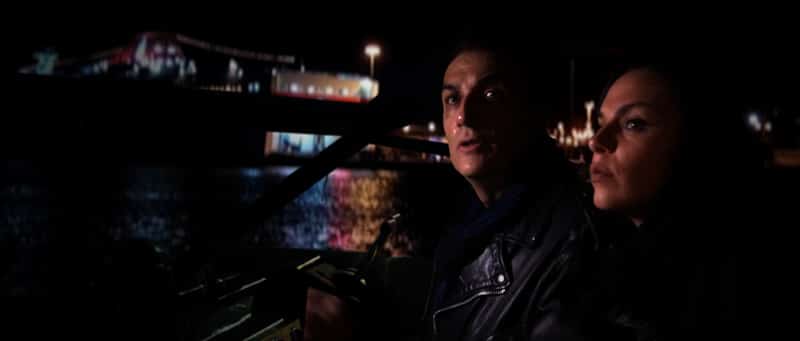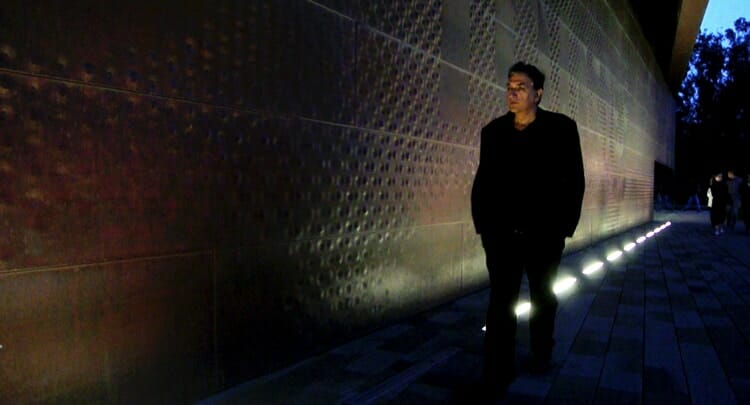Today, we have the pleasure of interviewing Peter Babakitis, He is a filmmaker based in northern California. He will be talking to us about the Success of his Feature Film ‘The Journeyman’.
About Peter Babakitis
He began his career after film school at Columbia College as a storyboard artist and visual effects specialist at Marin County’s Lucasfilm Ltd. He worked on award-winning feature films, games, and interactive media. He formed a production company, Image Garden Productions, which specialized in educational films featuring original songs and puppets. They eventually produced the Emmy-winning Classic Stories for Children. Peter followed that success with his first foray into the art-house genre with Kuksu, a mind-altering journey into the California wilderness in the 1920s.
Having been a Shakespeare student since his undergrad days at the University of Illinois, where he had workshops in England at the Royal Shakespeare Company and the National Theatre, he produced his controversial Henry V, a contrarian interpretation of the Shakespeare play, revealing some of the more sinister facets of the warrior king that are usually ignored in most contemporary versions. This offbeat, guerrilla production has been studied extensively in the academic world in several books and essays, notably in Screening Shakespeare in the 21st Century from the University of Edinburgh Press.
He then was swept up in the interactive media revolution, and as a storyteller and conceptual visualizer, contributed to some of the most innovative products of the emerging interactive world, for companies like Apple, Microsoft, Paramount, Fox, Turner, Disney, Lego, and many others. During this period, he also directed the short film-noir A Prior Engagement and the music video for Melita’s “Connected.” During this period, he has also produced and directed numerous films for clients and institutions, such as the Getty, Kaiser Permanente, and others. He often acts in his own productions and makes numerous appearances on stage and screen.
The Journeyman represents Peter’s return to feature film production. It is a project which Peter has been researching for several years about the Euro crisis in his ancestral Greece, where the flawed European financial system has created a hotbed of intrigue and double-dealing that is the setting for this brisk political thriller.
About The Film – ‘The Journeyman’
Now on Amazon Prime Video, Peter Babakitis’s “The Journeyman” wins Best Independent Feature Film at this year’s Five Continents International Film Festival. Also, Madeline Merritt wins Best Supporting Actress for her role as Rachel, a devoted activist. Brian Narelle wins Best Supporting Actor for his portrayal as the secretive banker Waldenstein. Also winning is the Band Waverider ft. Sarah Rordam for their title song for “The Journeyman,” the moody hit “Grey Sky,” which takes Best Original Song this year.
High Finance, clandestine transactions, mysterious airport transfers, and professional assassins bring us into the high-octane world of “The Journeyman.” A taut and fast-moving adventure through the back streets of Athens, Zurich, and other international cities, we follow a rogue corporate spy and an underground activist in their race to expose massive financial crimes, while being pursued by ruthless assassins.
“The Journeyman’s” moody and gritty cinematic ride and Chinese-puzzle mystery plot, seldom seen in indie movies, have won this movie numerous other international awards, including the prestigious Best Feature Thriller Award from the Austria International Film Festival, and awards from numerous other festivals.
The Screen Debut of popular San Francisco model/writer Krystal Langevin is a thrilling feature of this indie hit, which has deservedly landed her two Best Actress Awards, and international praise for a tough, soulful performance as the journalist Ariana.
Also featured is one of the offbeat stars of indie film, Brian Narelle, star of John Carpenter’s cult classic “Dark Star,” and other intriguing indie and art-house favorites, like “Kuksu” and “Space Ninja,” and recently the Netflix series “13 Reasons Why.” Brian Narelle portrays the mysterious and secretive client Waldenstein.
Madeline Merritt appears as Rachel, the California activist who fights to expose the secret dealings of corrupt bankers that influence elections. The star of numerous movies on Netflix like The Guest House and American Idiots, she delivers an award-winning performance in The Journeyman.
The lead role of Lawrence, a beleaguered corporate spy turned rogue, is portrayed by the director himself, Peter Babakitis, known for his offbeat performance as Shakespeare’s Henry V. Lawrence is a classic introvert detective/witness torn from his comfort zone into a foreign world of deadly intrigue, where the journalist Ariana becomes his guide and partner as they race to expose the criminal dealings of an international gang.
“The Journeyman” debuts this fall on Prime Video, as well as other premium streaming services internationally.
Let’s Start with the Interview now!
Betterauds Team: “The Journeyman” is a thinking person’s thriller, something we don’t usually see.
Babakitis: I wanted to draw the audience into a dreamlike state; even though it’s a classic mystery about high crimes, they are not the usual crimes that we are used to seeing.
Betterauds Team: The music is an interesting mix of digital music and ambient sounds. It has some vintage recordings of Greek clarinet music as well.
Babakitis: I gathered a bunch of ethereal loops, and some stuff that I generated myself to provide a palate of moods, and from time to time as we resolve the story about the specifics of Greek culture, I brought in the bars from the old 78s to remind us of the age and gravitas of the culture.
Betterauds Team: Was it a concern of yours that the character of Lawrence, that you play yourself, is a relatively passive character?
Babakitis: It is important to have a vessel that carries us through the story. The film began as my discovery of an economic and political situation in Greece, so the character’s role as a witness is a perfect parallel to my experience in developing “The Journeyman.”
Betterauds Team: When it comes time to take action, he eventually steps up, but reluctantly.
Babakitis: By that point in the story, he’s giving up any thoughts of going back to the person he once was. His world was hanging by a thread, his job, his relationship, his sense of himself. It’s his encounter with Ariana that gives him a new way out, a new possibility that can give his life the meaning it lacks.
Betterauds Team: Her unshakeable conviction is refreshing. She is idealistic without seeming naïve.
Babakitis: Heroes don’t need superpowers; they need the power of conviction.
Betterauds Team: Do you like to make the film in the cutting room, or do you do have all the editing in your head as you shoot?
Babakitis: I think you need to do both. Because I work very cheaply with limited resources, I have very specific things in mind when I am shooting.
Betterauds Team: How did you work out the conception of the film’s look? It’s quite a range, with some dynamic compositions that are clean and modern, but also lots of gritty scenes that seem very much like a documentary or even police footage.
Babakitis: The project started with that footage- I happened to be in Athens in 2014, and I inadvertently got caught in some protests and clashes with police, and witnessed a car bombing. I had my cameras on that trip, so I shot those scenes that appear in the film. The story came later as I decided that the best way to explain it was to weave a political thriller around the footage I had gathered.
Laura shot the slick stuff in the beginning at the museum, and Teri
supplemented the documentary stuff with second unit footage of other Athens protests and street activity that she gathered heroically undercover.
Betterauds Team: We don’t see a lot of stories where a cynical character goes through a transition of the kind that Lawrence goes through, towards a more optimistic, idealistic attitude.
Babakitis: He is, after all someone who wishes the world was better. Ariana’s hope is contagious, and he gets a good dose of it.
Betterauds Team: You are making films not only outside of the Hollywood system but also the streaming services, but the film has a sweeping, large canvas sort of international thriller kind of feeling…
Babakitis: That’s the feeling that I was going for- emphasis on “Feeling.” By staging the action in some real, grand scale locations, it gives it the sense of distances, of scale, of ground covered, which contributes to the epic feeling.
Betterauds Team: As you get older, are you still finding films that turn you on as much as stuff that inspired you in your 20s?
Babakitis: It continues to happen. I’m finding lately that I notice qualities of some lesser films that are accidental and more cultural- for instance, “The Journeyman” owes a lot to the international thriller genre of the ’60s and ’70s. I go through obsessive periods- Now I seem to be gravitating to some Nicholas Roeg gems, and 60’s British movies with Michael Caine. Caine seems to really nail the ability to be both active and passive on camera, while making it seem effortless.
Betterauds Team: What about directors?
Babakitis: Roeg fascinates me. Ken Russell as well-Track 29 is amazing. I guess I’m in that 60’s/70’s British kick at the moment.
Betterauds Team: How did your first feature, Kuksu, segue to the production of Henry V? In what ways is one film crucial to the understanding of the other?
Babakitis: In each of my films, I like to use a protagonist as a surrogate for the audience, to take them to a place of crisis that can give them some kind of insight. I think that most people live their lives avoiding crises, which is a good thing, but in drama we allow the imagination to go to those places that would not be advisable in real life by choice.
Betterauds Team: What attracts you to stories about obsessive personalities?
Babakitis: What’s interesting in a drama is how a character reacts when circumstances occur that weren’t planned for, which makes the character vulnerable.
Betterauds Team: Why vulnerability? Is strength not interesting enough?
Babakitis: I don’t think strength can be revealed unless the character is made vulnerable by the situation.
Betterauds Team: How would you describe your relationship with your acting partners? How do they help you get your vision to the screen?
Babakitis: I think we inspire each other. I plan the characters as markers in a storytelling strategy, but then they need to be brought to life by the actors, who draw from their own imagination and experience to create something that I could never have anticipated.
Betterauds Team: How did you work with Krystal Langevin about grounding the material in a sense of realism?
Babakitis: Krystal is a brilliant actor with a strong and unique presence. She is a no-nonsense realist herself, and naturally veers away from too much romanticism or sentimentality.
Her training with the American Conservatory Theater really shows. We immediately had easy chemistry, and we got to know each other really well. I showed her some of the speeches of Yanis Varoufakis, and she was able to absorb the qualities of an educated, modern Greek with a political conscience, and a sense of urgency with regard to the crisis at hand.
Betterauds Team: You have some great performances from Brian Narelle as Waldenstein, and Mark Petrakis as Stravos. What was it like working with them?
Babakitis: I’ve known Brian for many years, and he’s been in several of my films at this point. It’s funny because he’s normally a hilarious comic actor, yet I always cast him in these serious, somewhat sinister roles. It’s because he has a brilliant sense of timing and clarity that comes from his comic and theatre work.
Betterauds Team: Yes, he has a compelling kind of intensity.
Babakitis: Mark Petrakis is also a comedian, and I remembered him from an act he used to do 20 years ago, so when the role of Stravos came about, he kept popping up in my mind, so I called him up, and he was perfect. I’d love to work with the two of them together again in something.
Betterauds Team: Do you have a new project in the works?
Babakitis: “The Journeyman” has opened up new opportunities, to be sure. Right now, I’m dealing with the overwhelming response to “The Journeyman,” So it will be a while before something reaches the stage of a public announcement.
Thank you so much for giving us your precious time! We wish you the best for your journey ahead!



